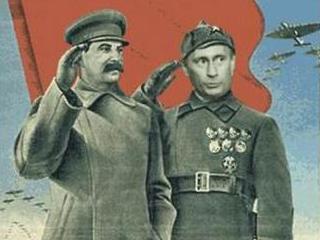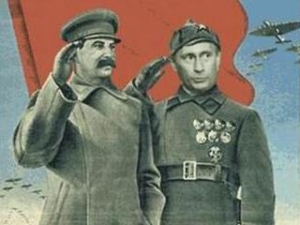Two Possible End Games in Ukraine
Brothers in Authoritarian Leadership: Stalin and Putin (h/t openDemocracy, (CC BY-SA 2.0)
With all the conversations around Russia’s withdrawal from around Kyiv in order to refocus on the Donbas, and the discussions of the various negotiations that seek to arrange for a cease fire if not a complete end to the fighting, there are two big possible end games that appear increasingly likely to me, though I don’t see anyone publicly talking about them. (More common are big picture “likely outcome” pieces like this.) I don’t know the odds of either of the following two end games happening, but the odds are not zero for either one of them and, IMHO, they are going up.
End Game 1 begins with a simple premise: from Putin’s point of view, Putin cannot fail – he can only be failed.
Given the demise of the initial battle plan of some of Putin’s generals and the absence of the cake walk with Ukrainians greeting the Russian Army as liberators predicted by at least some of Putin’s intelligence officers, there is plenty of failure to go around.
Per BBC Russian, via The Guardian, the Russian officer corps has been taking extreme casualties.
. . . [G]rowing evidence suggests high numbers of casualties among the units that led Russia’s invasion in February, including paratrooper units considered to be the “tip of the spear”.
The video of the memorial for the 247th Guards Air Assault Regiment, which is based in Stavropol, Russia, showed a number of men whose deaths have already been confirmed through public accounts.
Another video from a nearby cemetery that is used by the unit, along with others, showed a long row of funeral wreaths.
The unit was reported to have fought in southern Ukraine near the city of Kherson, which has been held by the Russian army since late February. A Ukrainian counter-attack near Kherson has led to heavy losses for Russian troops there.
Last month, Russia reported the death of the commander of the regiment, Col Konstantin Zizevsky, one of at least eight Russian colonels to have been killed during the war in Ukraine.
BBC Russian, which has kept a confirmed count of the number of Russian losses, has said that 217 of its 1,083 confirmed Russian war dead were officers, from junior lieutenants to generals. Senior Russian officers often fight alongside their units because decisions must be confirmed by higher-ranking personnel.
Of the confirmed deaths in the military, more than 15% come from Russia’s elite airborne, or VDV, units. The high number of losses among those units has also been accompanied by reports of desertions.
The NY Times emphasizes those casualty figures in this little nugget on the BBC report:
The Russian service of the BBC counted 1,083 military death announcements by local officials or news outlets. But 20 percent of those deaths concerned officers — a disproportionate toll indicating that vast numbers of deaths of lower-ranking soldiers may be going unreported.
Lots of dead officers means lots of newsworthy funerals, funerals, and more funerals. Add in reports of desertions by soldiers already in Ukraine. And now this as reported by the NY Times:
Word of the dangers of fighting is filtering down through the public in Russia. Mikhail Benyash, a lawyer in the southern city of Krasnodar, said he had received more than 100 requests from Russian military and national guard service members about their legal rights should they refuse to fight.
“They don’t see a point in killing anyone,” Benyash said. “Plus, they don’t see a point in being killed.”
From Putin’s POV, all of this is unacceptable, and all of it is proof that he has been failed. This, obviously, cannot be allowed to stand. With End Game 1, the question for Putin is who he should hold responsible for these failures.
Russian history demonstrates how a leader obsessed with his personal power and who sees himself as the embodiment of the nation reacts to a situation like this: he makes An Example of someone. Or several someones. Or hundreds of someones. In the post-WWII USSR, Stalin invented what came to be known as the Doctors’ Plot — a conspiracy theory that various doctors had or were preparing to kill various Soviet leaders. Stalin did so in order to justify a purge of his political enemies, consolidate power, and in various other ways continue to build up the cult of personality around him. The only thing that saved these doctors was that Stalin died before the trials could be held.
Three years later, Stalin’s successor Nikita Khrushchev denounced Stalin in his secret speech to the 20th Communist Party Congress entitled “On the Cult of Personality and its Consequences.” As Khrushchev noted, the Doctors’ Plot was but a small piece of a larger whole for Stalin:
Stalin’s willfulness vis-a-vis the party and its central committee became fully evident after the 17th party congress, which took place in 1934…
It was determined that of the 139 members and candidates of the party’s Central Committee who were elected at the 17th congress, 98 persons, that is, 70 percent, were arrested and shot (mostly in 1937-38). [Indignation in the hall.] . . .
The same fate met not only the central committee members but also the majority of the delegates to the 17th party congress. Of 1,966 delegates with either voting or advisory rights, 1,108 persons were arrested on charges of anti-revolutionary crimes, i.e., decidedly more than a majority. This very fact shows how absurd, wild, and contrary to commonsense were the charges of counter-revolutionary crimes made out, as we now see, against a majority of participants at the 17th party congress. [Indignation in the hall.] . . .
The parallels between Stalin and Putin are . . . troubling. The murder of Boris Nemtsov. The repeated assassination attempts against and subsequent imprisonment of Alexei Navalny. Dig a little more, and you come to names like Sergei Magnitsky, Anna Politkovskaya, Alexander Litvinenko, . . .
The list is long, and the pattern is clear: cross Putin or fail Putin, and Putin will have you killed.
So how might Putin choose to deal with the generals, colonels, and intelligence officers in Moscow who failed him? The more charitable path would be that Putin reassigns them to take the places of the generals, colonels, and intelligence officers killed in Ukraine. I say “charitable” because this lets them take their chances with the Ukrainians, who seem incredibly good at killing senior Russian officers, but not completely effective at it.
The less charitable path cuts out the Ukrainian middle men, and is more emphatic and more thorough: Putin simply executes them in Russia. I can hear the statement from the Kremlin now . . . “They did not properly train their troops . . . They criminally diverted money to equip our fine troops with the equipment they needed, and lined their own pockets instead . . . They lied to me about the prospects of this special military operation . . . They were acting as spies for the West . . . They have failed me. They have failed Russia. They have failed you, the Russian people. They will do so no longer.”
Either way End Game 1 is for Putin to declare failure in Ukraine, blame it on military and intelligence officers he wants to get rid of, dispose of them, and move on from there.
Which brings us to End Game 2.
Russian military and intelligence officers are no doubt much more acutely aware of and worried about End Game 1 than I am. End Game 2 is that the generals take matters into their own hands, hoping for a more successful result than Operation Valkyrie had on July 20, 1944.
Of course, Putin is aware of the possibility of End Game 2, which may make him more anxious to work toward End Game 1. But the generals know that Putin is aware of this, which may make them more anxious to work toward End Game 2. But Putin is aware that the generals are aware . . .
Let me be clear: I have no secret sources in anyone’s intelligence agencies. I simply read what is publicly available, and put it alongside a bit of historical perspective. As I said at the top, I don’t know the odds of either of these End Games happening. But between the sanctions taking a stronger bite every day and the ongoing military failures on the ground in Ukraine, Putin and his generals both need some way to bring this to an end, and fast. End Game 1 will accomplish that, and so will End Game 2.


